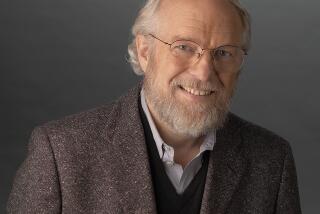Norton Utilities Guru Steps Out of the Limelight
- Share via
To the millions of personal computer users who have come to depend on his software programs and who have dubbed him the “software saint,” the realization that Peter Norton has limits like any other mere mortal may be a bit hard to accept.
But it’s true. Peter Norton--by his own admission--no longer can run Peter Norton Computing, the software publishing house he founded in Santa Monica six years ago. And so today marks the completion of one of the most critical transitions in the life of a young company: from management by its founder to management by professionals recruited from other successful computer ventures.
“I’m not an executive and never was,” admits Norton, the creator of the million-selling Norton Utilities, the program that, among other things, allows computer users to retrieve files that were carelessly or inexplicably zapped into oblivion. “My company has outgrown my management ability.”
Ads to Continue
Two weeks ago, Norton, a tall, gawky fellow who appears far younger than his 45 years, turned over the reins of his company to a new chief executive, Ronald Posner, whose experience in the PC software industry includes stints at Borland International in the Silicon Valley and Ashton-Tate in Torrance. And today, David Blumstein joins Norton from Ingram Micro D distributors in Santa Ana as president and chief operating officer.
What will happen to Norton, one of the Los Angles area’s few high-tech superstars?
Well, for starters, he gets to continue appearing in the Dewar’s Scotch ads, which are plastered all over freeway billboards and national magazines. As company chairman, he’ll also concentrate on software planning, and he should have a lot more time to spend on his favorite avocation: patron of the arts in Los Angeles and Santa Monica.
Job Hopped
Just 10 years ago, few would have predicted that Norton would become a sort of elder statesman in the computer industry. After dropping out of college in the middle of his senior thesis and taking another four years before completing his education, Norton spent the next 12 years drifting from one computer job to the next, never staying at one more than two years.
Today, he lives with his wife and young children in a Santa Monica mansion filled with wild contemporary art and motors around the Westside in a gray BMW with a “MRIBMPC” vanity plate.
“His program established the category of what we now know as PC utility programs,” says Stewart Alsop, a personal computer market analyst in the Silicon Valley. “These programs overcome the shortcomings of computers, and his overcomes the biggest shortcoming of them all: the loss of your work. . . . He is an enormously respected figure in the business.”
On the strength of Norton’s initial utilities program, introduced in 1983, and a couple of others, Peter Norton Computing reported sales last year of about $15 million. The company isn’t about to rival Microsoft, which is galloping toward the $1-billion sales mark, for the No. 1 spot among software publishers. But it is sufficient to give the company the No. 30 spot in an annual ranking of the 100-largest software publishers compiled by Soft-Letter, a Boston newsletter.
But the new management, with chairman Norton cheering them on, isn’t content with being just No. 30.
The Next Generation
In an interview from their offices overlooking the Santa Monica pier, Posner said he and Blumstein will be responsible for mapping and executing a strategy to expand the business more quickly, a strategy that could include acquiring smaller software houses and taking the company public in the not-so-distant future.
Although reluctant to reveal the precise directions of the future growth, Posner says he is eager to exploit untapped opportunities for the company’s existing product line in international markets. In addition, he said the company, whose products so far have been written exclusively for IBM and compatible personal computers, is developing similar programs for other computers, such as Apple’s Macintosh.
The company is writing programs to run on computers using Unix, a set of computer operating instructions that typically run sophisticated and powerful systems used by scientists and engineers. Although the market for Unix machines so far has been limited, they figure to be used more frequently in the future as general-purpose office machines.
“It’s a hot market and one that we want to be in,” Posner says. “And the basic service of our Utilities program is a natural for any computer. . . . In fact, you can expect to see us on all major machines in the future.”




